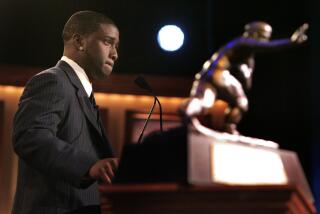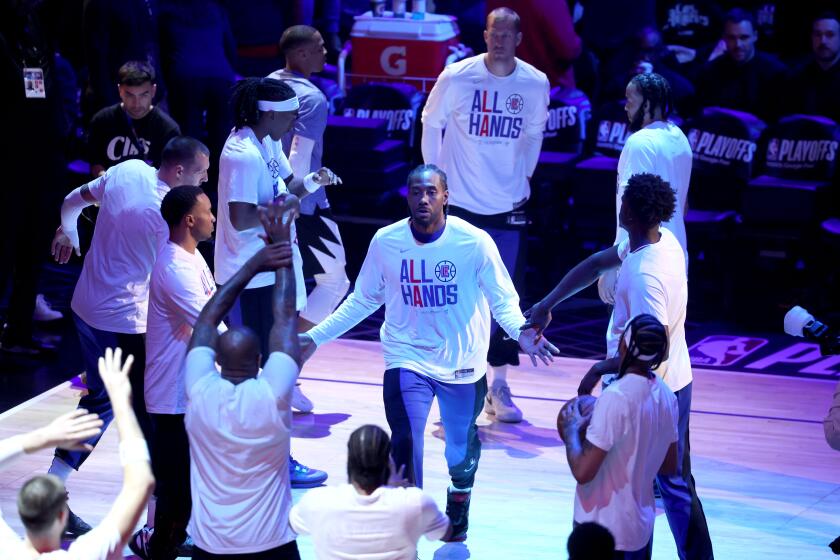Ravens use tactic with due respect
The refrain began soon after the Baltimore Ravens left the field Sunday with a decisive playoff win in hand. Defensive coordinator Rex Ryan was only too happy to nudge it along.
“Nobody has respected this team until right now, and that’s fine with us,” Ryan said. “Tough on everybody else, just right for us.”
Respect is a motivational tactic as old as sport itself. Coaches and players portray themselves as unwanted, overlooked and underpraised. Around every corner lurks another rival ready to steal credit. And the only way to seize that magic respect is to rise up and take it on the field.
So be prepared before the Ravens play the Tennessee Titans on Saturday to hear about how John Harbaugh was ignored in coach-of-the-year voting; how Joe Flacco went unnoticed by offensive rookie-of-the-year voters; how Ed Reed’s big plays couldn’t get him more than eight votes for defensive player of the year; and how no one picked the Ravens to come anywhere near the playoffs.
If the steady drumbeat about disrespect sounds silly coming from veteran coaches and perennial Pro Bowl players, well, understand that they do it for a reason.
“It’s effective,” said Eric Morse, a North Carolina sports psychologist who worked with teams at the University of Maryland. “Coaches and players look for bulletin-board material, and if it’s not there, sometimes they drum it up. It’s one of the few ways to tap into athletes’ internal motivation for doing what they do.”
Joel Fish, a Philadelphia-based sports psychologist who has worked with players from the Philadelphia Eagles and other pro teams, said that with quotes being chopped up and repeated on a 24-hour news cycle, inflammatory talk -- or anything that can be interpreted as such -- abounds more than ever. He said players use it most effectively when they genuinely believe they’re being disrespected.
“I think it makes it personal,” Fish said. “Athletes have a lot of pride, and athletes like to compete, so it can give a real emotional boost to a player or team.”
Asked about motivating his team with talk of respect, Harbaugh said, “Guys get motivated a lot of different ways. It’s a great question. It’s interesting. I’m not sure exactly how our guys look at it. We believe in one another, and we’ve got a big challenge in front of us. They’re playing really good football, and our football team is going to have to play better than their football team if we’re going to have a chance to win. So that’s how we look at it.”
Some of our greatest athletes are among the most fervent believers in using disrespect -- or the perception of it -- as fuel for their deeds.
Michael Jordan was widely considered the finest basketball player ever for much of his career. But no matter how many accolades he received, he kept his antenna tuned for any hint of slights coming from opponents or commentators. If anyone suggested an opponent might give Jordan difficulty, he worked himself into a competitive rage and, often, destroyed his would-be rival on the court.
Going into the 1992 NBA Finals, for example, some experts said that Portland Trail Blazers star Clyde Drexler was a serious threat to Jordan’s throne. Jordan abruptly silenced that talk with a record 35 points in the first half of his first game against Drexler’s team.
Type “Jordan” and “perceived slights” into Google and you get more than 8,000 hits. The motivational method became just as great a calling card as Jordan’s wagging tongue or Nike sneakers.
Michael Phelps followed the Jordan model in Beijing last summer. His former rival, Ian Thorpe, had said before the Olympics that no one could win eight gold medals in one meet. When Phelps saw Thorpe in the stands for one of his races, he remembered the comment and used it as motivation.
“Oh, yeah . . . I welcome any comments,” he told NBC’s Bob Costas after completing his historic run. “All they do is fire me up, and all they do for America is fire us up. Before the relay we were fired up, and that just made us more fired up and fueled us even more to get ready to swim. I always welcome it, and I love when people say that somebody can’t do something because you want to go out there and prove it that much more.”
Such motivational tactics also hold a place in Baltimore football history. Before the 1958 NFL championship game against the New York Giants, Colts Coach Weeb Ewbank reminded his players how many of them had been cast aside or flat ignored by other teams.
He told John Unitas that he’d been obtained for a 75-cent phone call. He told Raymond Berry that he was slow. He told Andy Nelson he was too small.
By the end of his rant, Ewbank had a team with six future Hall of Fame members thinking of itself as a band of misfits. The players had to prove they belonged on the same field with the glamorous Giants, he said.
As they reflected on Ewbank’s words 50 years later, surviving Colts gave mixed views on how effective they were.
“But it was a hell of a speech,” Hall of Fame member Gino Marchetti recalled. “Maybe it did help us.”
Some athletes are just as happy to leave the respect talk on the shelf. Asked this season about a lack of national buzz around the Ravens, center Jason Brown said, “Really, when it comes down to it, I don’t care.”
Titans Coach Jeff Fisher said that teams have “plenty of respect” for the Ravens.
“Maybe he needs to read the paper or watch TV,” Fisher said about Brown. “Obviously, they got plenty of respect from us. You know, if that’s the way you want to handle and motivate, then so be it.”
--
More to Read
Get our high school sports newsletter
Prep Rally is devoted to the SoCal high school sports experience, bringing you scores, stories and a behind-the-scenes look at what makes prep sports so popular.
You may occasionally receive promotional content from the Los Angeles Times.






